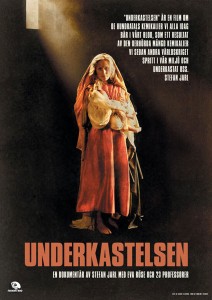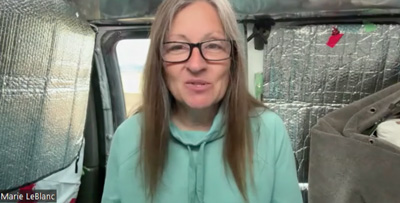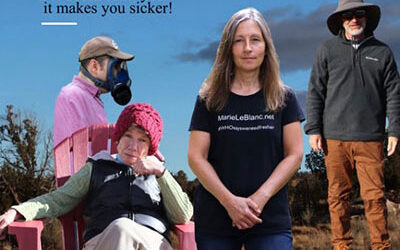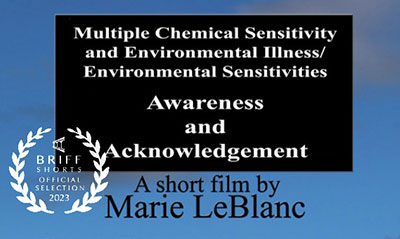a movie review by Sue Bozzo
 I saw the movie Submission: In Defence of the Unborn last night with two friends who are both chemically sensitive like me. This was the film’s U.S. premiere, at the Mill Valley Film Festival in San Rafael, California. Stefan Jarl, the Swedish documentary filmmaker who made the film, has won awards throughout his career, which began in the 60’s.
I saw the movie Submission: In Defence of the Unborn last night with two friends who are both chemically sensitive like me. This was the film’s U.S. premiere, at the Mill Valley Film Festival in San Rafael, California. Stefan Jarl, the Swedish documentary filmmaker who made the film, has won awards throughout his career, which began in the 60’s.
The movie begins with Stefan Jarl getting his blood analyzed. He had thought the film would be a sequel to his much earlier film, Nature’s Revenge, about nature being tinkered with and striking back. But this film took a different route. The analysis of his blood found hundreds of synthetic chemicals, and he interviewed scientists worldwide about what this means. The direction he took with the film did not include my friends and I, whose lives have already been derailed by chemical toxicity; his focus was the effect on future generations – the unborn.
It was a wonderful piece of art, and it was elegiac as opposed to alarmist, though it had a horrifying and galvanizing effect. I don’t understand the human race very well. I don’t understand why we are poisoning ourselves so thoroughly.
At any rate, the main point of the film was that there has been a turning point, in reproduction, that has already occurred. The film made the point several times that this issue is by far the worst in America, where we give the most free reign to the chemical industry, compared to other countries who have long since banned the worst offending chemicals (though those chemicals are very persistent in the environment and are still found in those countries).
This generation of children is the first generation of children born to parents whose bodies have bioaccumulated high amounts of synthetic chemicals. The most vulnerable stage in development is the embryonic stage — in the mother’s womb — and most of the chemicals and heavy metals that the mother carries in her body are transmitted to her fetus through the umbilical cord and placenta. These chemicals are hitting our unborn children during their embryonic development, and causing deformities that cannot be reversed. We are seeing an epidemic of autism, where children’s neurological development is deformed — they have lost something in those first moments of development that can never be retrieved. We are also seeing ADHD, hyperactivity, childhood diabetes, and childhood obesity. Especially in America, we already see the first generation of children that has been seriously affected, and some have been decimated. Those living in rural areas might not yet notice it. I have been living in an urban area, and I see the effects.
Stefan weaves some literary pieces in with the interviews and music. One is Franz Kafka’s Metamorphosis; another is an apparently Swedish story called “Storm,” about a young child named Gregor, who is deformed. It sounds like he is a monster, and he dies in childhood, and they are relieved. I had a nightmare last night, about whether we will decide to live with our deformities, or commit suicide.
There were also many scientists in the film who are studying the disruption of wildlife due to our chemical consumption. Many different forms of wildlife are having a lot of trouble with breeding — endocrine disruptors like DDT, PCB’s, Bisphenol A and phthalates are producing “males” who are hermaphroditic and have vaginas, and who have low to no sperm count. Apparently the sperm count in human men throughout the world has already decreased by 50%.
I don’t see how anyone could leave that film and continue in their usual lifestyle — using toxic personal care products, household cleaning products, and insecticides and pesticides, non-organic food, plastics, etc. And I don’t see how anyone could stand by and watch the chemical industry continue on, “as per the usual.” But, Jarl’s film title, “Submission,” is about just that — that humans seem to readily submit, easily willing to just continue on, as per the usual, and submit to the consequences.
Here are two book recommendations, related to the themes in the film:
• Our Stolen Future: Are We Threatening Our Fertility, Intelligence, and Survival?–A Scientific Detective Story by Theo Colborn
• Living Downstream: An Ecologist’s Personal Investigation of Cancer and the Environment by Sandra Steingraber
I wish everyone could see this movie. The DVD comes out in January. It is by a master filmmaker, who is facing these horrors with depth and responsibility.
Please don’t submit!
watch the trailer now:
Sue Bozzo took leave from Ph.D. work in Mythological Studies from a Depth Psychological Perspective eight years ago due to chronic illness. In her search to continue her studies, she has since become a dedicated meditation practitioner. She has spent the last three years essentially homeless due to Chemical Sensitivity and Electrical Hypersensitivity, moving from one temporary spot to the next as she seeks a long-term, safe-enough home. She intends to recover, pursue a career as teacher and healer, and be a responsible “canary in the coalmine.” She is grateful to her illness for the dramatic awakening that it has demanded about lifestyle and urgent global ecological concerns and psychological growth and healing.










I see that the film Submission was supposed to be released on DVD in January, but I cannot find it anywhere. The same with the Spanish film Los Pajaros de Los Minas.
Bill